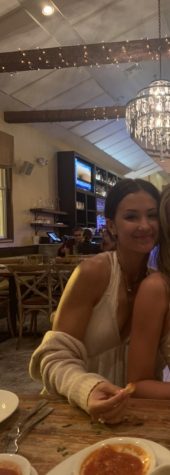OPINION: Costumes are make-believe, not mockery
October 14, 2020
Have you ever seen someone wear a gyspy costume? What about a Native American princess? Have you ever worn one of these costumes? If so, it could have offended someone because it is now considered cultural appropriation. By definition, cultural appropriation is the unacknowledged or inappropriate adoption of the customs, practices and ideas of one people or society by members of another, and typically more dominant people or society. In shorter words, it is stealing from a culture one is not a part of and mocking it in a way that is inappropriate. The question is: do costumes on Halloween count as cultural appropriation? In my opinion, no. I do not think that people are purposefully dressing in these costumes to appropriate people’s cultures offensively.
After talking to some students about the subject, I asked if they have heard about it and whether or not they believe that some Halloween costumes count as cultural appropriation. Juniors Jamie Lee Cataldi and Scot Lever expressed similar sentiments about the difference between Halloween and any other regular day.
“Well for one thing, Halloween is the one time of the year that you can literally be whatever you want, that’s what Halloween is,” said Cataldi.
“It’s just a costume for one day that kids wear because it looks cool or looks good,” said Lever.
Not only are the costumes just for fun, but the intentions are almost always not supposed to be bad. Unless someone is blatantly mocking someone’s appearance or accent in an insulting way, it should not be a big problem.
“The motive for what they’re dressing up as is completely out of innocence, at least unless they’re mocking someone’s culture. For example, I was going to be a ninja for Halloween and I heard about how that’s cultural appropriation, but I had no intent of making fun of anyone,” said Cataldi.
Junior Michael Sanchez and Lever make similar points. If one chooses to be for example, a ninja, that wouldn’t really seem like cultural appropriation because they aren’t choosing it to offend people, the motive for the costume is anything but cultural appropriation. It is because it looks cool.
“…To some extent. If you’re coming off as racist about it, then yeah it’s bad, but if you’re just making a simple outfit for Halloween…” said Sanchez. “They’re not meaning to mock anybody,” said Lever.
Some of these costumes include ninjas, voodoo witches, gypsies, day of the dead, Hawaiian girls, Egyptian princesses, Native Americans, etc. Even though the costumes themselves may definitely originate from another cultural background, Halloween is the one time someone can be whatever they want. Although it may not sound like a valid reason to other people, it is what Halloween is all about after all.
Another large misconception is which costumes technically could and could not count as cultural appropriation. Many costumes are actually meant to be certain characters or historical figures such as Disney’s Moana or Cleopatra. Reviews and articles online state that people were offended by white girls dressing up as those two characters for Halloween. However, this is not the copying or mockery of a culture, but rather dressing as a specific person. Therefore, by definition, it is not cultural appropriation. Many of the costumes being sold are also moderately Americanized. This relates to the original claim that the costumes are not meant to be a direct attack or insult to other cultures.
“People are just going to pick what looks cool, so if it’s an Americanized version [of their culture] wouldn’t that kind of show that they’re doing their own thing not really going off of anyone’s culture?” (Cataldi).
Halloween is a day for fun and make-believe, not for mocking people. Junior Caitlyn McManus does not see the harm in kids wanting to dress in these costumes.
“If you’re not intentionally mocking or harming in a way towards other people I think that it’s fine” (McManus).

